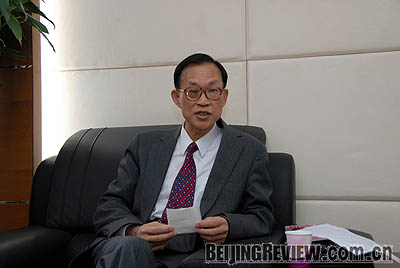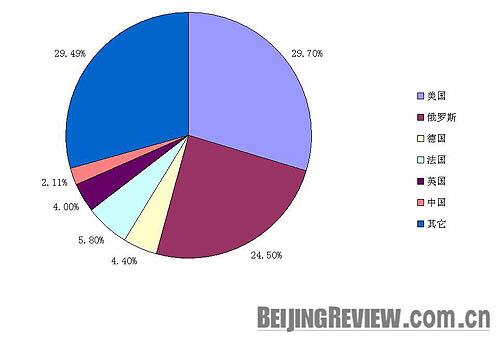|

As long as the African continent is mired in poverty, wars and chaos, the world will not be able to embrace common prosperity, said Liu. He is calling for the international community to assist the continent in resolving its problems with concrete actions, an endeavor that requires the collaboration of all countries and regions, including those from Europe, China and Africa. Liu recently made these and other assessments on the China-Africa connection at a joint interview with CHINAFRICA reporter Wang Zhe and Beijing Review reporter Yan Wei. The main points follow:
Energy cooperation
In a recent resolution, the European Parliament found fault with China's relations with African countries including their cooperation in the fields of energy and national defense. The criticisms from parliaments and NGOs in some European countries are unfounded, Liu said. China imports far less oil from Africa than Europe and the United States, he said. In 2006, oil output in Africa totaled 467 million tons. Given the fact that Africa exports 80 percent of its oil, its oil exports amounted to 374 million tons in 2006. In the same year, China imported 46 million tons of oil from Africa, accounting for 8 percent of its oil output and 12 percent of its oil exports. Europe bought at least 36 percent of Africa's oil exports, while the United States purchased 33 percent. "If they accuse China, a country that bought some 40 million tons of oil from Africa in 2006, of looting Africa's natural resources, how would they describe those bigger oil buyers?" Liu asked.
Arms sales
With regard to China's arms sales to Africa, Liu said China takes only a small share of the international weapons market. According to statistics of the Stockholm International Peace Research Institute, the United States was responsible for 29.7 percent of the world's conventional weapons exports in 2006, ranking first worldwide, followed by Russia, 24.5 percent; Germany, 4.4 percent; France, 5.8 percent and Britain, 4 percent. China accounted for 2.11 percent, ranking sixth (see pie chart). In 2007, the institute looked at the exporters' arms deliveries. The United States, again, took the first place with its arms deliveries amounting to $7.45 billion. It was followed by Russia, $4.59 billion; Germany, $3.4 billion; France, $2.7 billion; Britain, $1.15 billion; Italy, $560 million; and Spain, $570 million. China took the eighth spot with $360 million in arms deliveries (see bar chart).
"Both figures-2.11 percent and $360 million-are evidence that China's arms exports are extremely limited in quantity," Liu said. "It is unreasonable to make a fuss about China's normal arms trade with Africa."
As an arms exporter, China sticks to the following principles: First, it does not export weapons to non-state entities. Second, its arms exports are extremely limited in quantity, and it only provides conventional weapons. Third, it requires that the purchaser produce an end user certificate to prevent it from transferring the weapons to a third party. Fourth, the weapons it exports should be used by sovereign states for the purpose of national defense. These principles are in conformity with UN resolutions, Liu said.
Features of China-Africa trade
Liu said China-Africa trade cooperation exhibits the following prominent features:
--Equality. China treats Africa as an equal partner. It does not impose its will or practices on Africa, nor does it uses its assistance to and trade with Africa as leverage to interfere in Africa's internal affairs.
--Mutual benefit. While assisting Africa in its development, China gains support from Africa. Both China and Africa benefit from their cooperation. China does not view the cooperation as almsgiving but gives full consideration to the interests of African countries. It consults with African countries before determining cooperative projects so that these projects serve the countries' actual needs.
--Good faith. China always honors its commitments with a series of concrete measures. For example, it pledged to forgive the debts of some heavily indebted poor countries in Africa at the First Ministerial Meeting of the Forum on China-Africa Cooperation in Beijing in October 2000. Within less than three years, it cancelled 10.5 billion yuan (about $1.5 billion at the current exchange rate) in debts owed by African countries. It fulfilled its commitments in terms of opening markets to Africa, training African professionals and establishing a fund for human resource development ahead of schedule. Chinese President Hu Jintao put forward an eight-point proposal on assisting Africa's development and strengthening China-Africa cooperation at the Beijing Summit of the Forum on China-Africa Cooperation in November 2006. These proposals were also put into practice swiftly.

In the first half of 2007, top Chinese leaders Hu Jintao, Wu Bangguo, Chairman of the Standing Committee of the National People's Congress and Jia Qinglin, Chairman of National Committee of the Chinese People's Political Consultative Conference, paid separate visits to Africa. One of their missions was to deliver the achievements of the Beijing Summit to the African people by signing agreements with the countries they visited.
The China-Africa Development Fund has been launched as China's first equity investment fund focusing on Africa. The initial investment in the fund was $1 billion, and it will eventually reach $5 billion. Unlike governmental assistance, the fund has no national investment quotas. It can be freely invested in projects in African countries in agriculture, manufacturing, infrastructure and Chinese industrial zones to help improve the livelihoods of the Africans.
|
